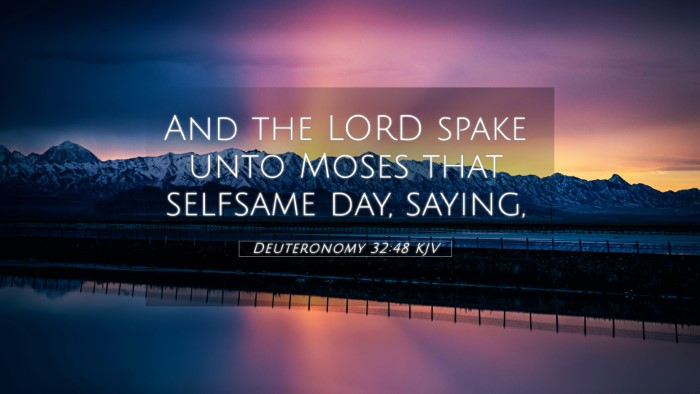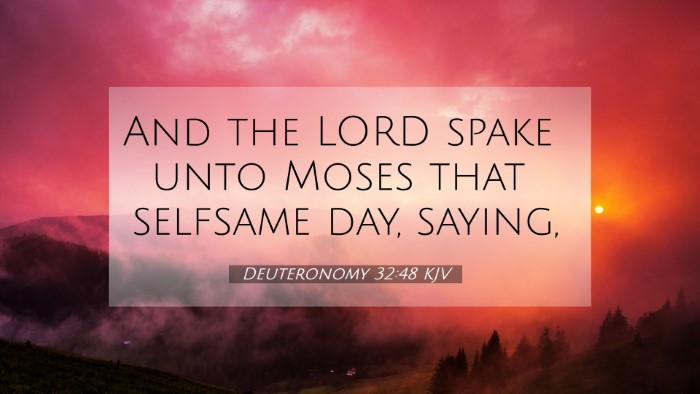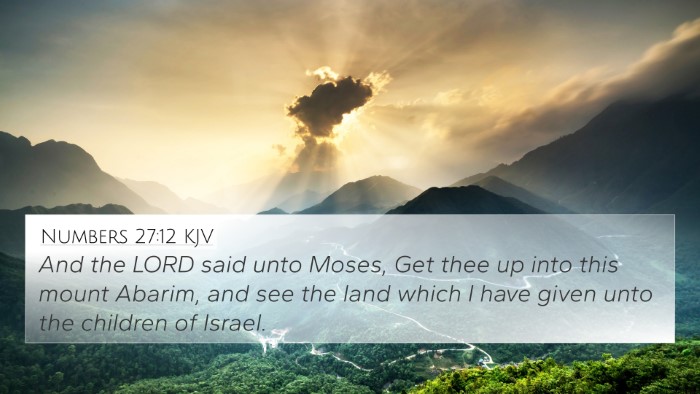Understanding Deuteronomy 32:48
Key Verse: “On that same day, the Lord spoke to Moses, saying…” (Deuteronomy 32:48, NKJV)
Verse Context
This verse occurs at the conclusion of Moses' song and marks a significant moment where God communicates with Moses regarding his impending death and the transfer of leadership. It signifies the divine plan moving forward as the Israelites are prepared to enter the Promised Land.
Commentary Insights
The commentaries offer insights into Deuteronomy 32:48, illustrating its implications for understanding God's covenant, leadership, and transition of power.
- Matthew Henry: Henry emphasizes how God speaks with authority, reminding Moses of his appointed time to die, which underscores God's sovereignty and Moses' anticipated legacy. This moment serves not only as a reminder of mortality but also as an encouragement for Moses to fulfill his last tasks.
- Albert Barnes: Barnes highlights the gravity of this message. It indicates that Moses is not to see the promised land, which reinforces the concept of accountability in leadership. Despite his faithfulness, Moses is reminded of the consequences of past actions—showing God's judgment and mercy intertwined.
- Adam Clarke: Clarke interprets this proclamation as a reminder of the transition that is about to take place, identifying successors for Moses and establishing Joshua's role. Clarke discusses how this event prepares the people for the changes ahead while maintaining faith in God's promises.
Thematic Bible Verse Connections
The themes from Deuteronomy 32:48 resonate through various other scripture passages. Here are some inter-Biblical dialogues that relate directly to this verse:
- Numbers 20:12: God decrees that Moses will not enter Canaan due to his disobedience, highlighting the principle of accountability in leadership.
- Joshua 1:1-2: This passage marks the transition of leadership from Moses to Joshua, fulfilling God’s instruction and confirming divine succession.
- Deuteronomy 31:14: God instructs Moses and Joshua regarding their next steps, emphasizing the importance of divine guidance in leadership transitions.
- Psalm 90:3-4: This psalm reflects on the nature of man's life, similar to Moses’ situation, considering the ephemeral nature of human leadership.
- Hebrews 3:5-6: Refers back to Moses as a servant, establishing his legacy while pointing towards Christ's superior role, thus revealing the progression of God’s plan through various leaders.
- 1 Chronicles 23:14: Discusses the lineage of priests and Levites, showing how God's covenant continues through appointed leaders.
- Malachi 2:7: Addresses the role of the priest as a messenger of the Lord, paralleling the responsibility given to Moses.
Cross-Referencing Bible Study Methods
Utilizing cross-referencing for deeper insights on Deuteronomy 32:48 enriches our understanding of biblical leadership and transitions. Here are some methods to enhance your biblical study:
- An organized Bible concordance to identify similar themes and contexts.
- A cross-reference guide to find linking verses in systematic theology.
- Utilizing a Bible reference resource to study the implications of leadership across scriptures.
Conclusion
Deuteronomy 32:48 serves as a crucial reminder of God’s sovereignty and the accountability inherent in leadership positions. This verse, while poignant in its immediate context, also bridges themes found throughout the entirety of scripture, reinforcing that every leader's legacy is rooted in obedience to divine instructions and guidance.
Further Study Suggestions
For those wishing to explore further:
- Investigate how to find cross-references in the Bible effectively.
- Learn about identifying connections between Old and New Testament regarding leadership and faithfulness.
- Engage in a detailed cross-reference between Gospels that reveals relational dynamics among biblical characters.



